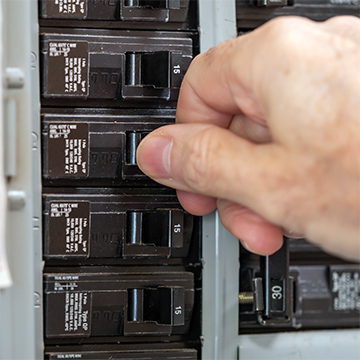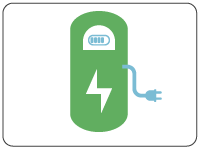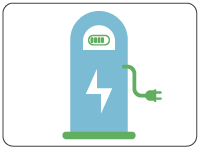EV Chargers
When discussing EV chargers, Burlington Electric Department offers two separate incentives:
- A rebate on the EV charger hardware itself (this page)
- A special reduced EV rate on the electricity used to run the charger
This page is all about the first incentive, the rebate on the EV charger hardware. You can learn about our special reduced EV rate on its own page.
Single-Family Homeowners
Rebate: Up to $900
We now offer a rebate of up to $900 for an EV charger. The amount of your rebate is determined by the EV you purchased that will be using this charger. Please read the Terms & Conditions for more details.
We are currently only offering a rebate on the ChargePoint Home Flex charger.
Level 2 EV chargers may require an upgrade to your home’s electric panel. BED has teamed up with local banks to offer low financing rates for these upgrades.
Local Businesses
Rebate: Up to $2,500 Per Port
We are now offering a rebate of $2,500 per port (up to 75% of the installed cost) for workplace EV charging stations. Contact Energy Services for more information.
Multi-Family Properties
- Increases convenience and availability of charging
- Provides a return on your investment
- Property Owners/Managers: Make your property more desirable and take an active part in Burlington’s Net Zero Energy future with EV charging stations.
- Residents: Encourage your property manager or condo association to take advantage of EV charging to improve the value and long-term enjoyment of your home.
Rebate: $1,000 for Multi-Family Properties
This option is for multi-family properties who are looking to provide charging as an amenity to their residents and does not include a charging software platform to recover the cost of charging by individual users. A level 2 charger is required with a rated amperage of 30 or above. This option also includes a $500 additional incentive for eligible properties with more than 15% of their units designated as low-to-moderate income housing. An additional $500 bonus is available if the the charger is made available to the public at least from 9am to 5pm during the week.
Electric Panel Upgrades

With the growing popularity of heat pumps, electric vehicles, and other electric appliances, some Burlingtonians may soon reach the limits of their current electric panel. Upgrading your panel to accommodate your current and future needs — and help the city’s Net Zero Energy goal — requires some preparation. Burlington Electric Department can help you navigate this process.
Where To Begin
Call a licensed electrician. Any work done on your electric panel must be done by a licensed electrician. Burlington Electric Department recommends our partners in Vermont’s Efficiency Excellence Network. They have the expertise to deliver the highest-quality services to our customers. Note that workforce constraints are impacting contractor availability so we recommend contacting multiple professionals to compare pricing and project timelines.
Your electrician will contact Burlington Electric Department. Because your electric panel is inside your home (“behind the meter”), you will be responsible for hiring the electrician. However, you will still need to coordinate with BED on a few points like temporarily shutting off the power to your property while your electrician switches over from the old panel to the new panel. Your electrician is best qualified to speak to our team on your behalf.
There may be a charge from BED for the upgrade. In addition to your electrician’s fees, Burlington Electric Department may need to charge for the upgrades to our infrastructure to accommodate your property’s increased needs. This will be determined upon receiving and reviewing the Contractor Application submitted to BED by the electrician.
Financing
Several local credit unions are now offering exceptionally low rates on financing for panel upgrades in addition to their special rates on heat pumps and electric vehicles.
| GMCU | BED Renewable Energy Loan |
| Opportunities Credit Union | Home Improvement Loan (EV) Home Energy Loan (HP) |
| Vermont Federal Credit Union | Energy Efficiency Home Improvement Loan |
| EastRise | Green Loans |
Weatherization Repayment Assistance Program (WRAP)
The Weatherization Repayment Assistance Program (WRAP) allows homeowners and renters to finance qualifying weatherization projects like insulation and air sealing, as well as heat pumps and advanced wood heating systems, with repayment through a monthly charge on their utility bill. Learn more.
Simplified Installation Process
1. Estimate the Use of EV Charging
This involves determining the level of use your EV charger will be expected to meet. This can include issuing a sample survey to users to determine their charging needs.
2. Choose the Power Level of EV Charger/s
Level 1 Charging uses a standard 120-volt outlet just like you have all around your home.
- Pros: less expensive to set up; ideal for homes and workplaces where a vehicle can charge for 8 hours or more at a time.
- Cons: delivers only 3-5 miles of range per hour you are charging.
Level 2 Charging uses a special charging device plugged or hard-wired into a 240-volt outlet (like your clothes dryer uses).
- Pros: delivers 10-40 miles of range per hour you are charging; and rebates available from BED.
- Cons: more expensive to set up and may require additional electrical work from a licensed electrician.
3. Choose the Model of the EV Charger/s
There are several factors to consider when choosing your charger model. These include:
- Single-port vs Multiple-port EV Chargers
- Type of mounting system
- Ability to collect payments for charging, if desired
- Charger scheduling and reservations
- Limiting user access
- Cord management
- Energy monitoring
Speak with your electrician or BED Energy Services to learn about your options and current programs.
4. Choose Your Electrician
All EV chargers must be installed by a licensed electrician. Check out our Tips for Hiring an Electrician to find out more.
Based on local requirements and your future plans, be sure to speak with your electrician about electrical upgrades. Upgrades can be done at one of three levels:
- EV Charging Capable: Connecting the EV charger/s to the electrical service so you have adequate panel capacity to accommodate the installation of a dedicated branch circuit and the EV charger/s.
- EV Charging Installed: Having the electrical capacity needed to support installed and working EV charging equipment.
- EV Ready: Often called “make-readies.” Includes the installation of dedicated branch circuit/s, circuit breakers and their electrical components needed to support the future installation of EV charging equipment.
After consulting with your electrician, determine which level of upgrades you want before beginning the process.
BED has partnered with local credit unions to provide exceptionally low rates on financing for electrical panel upgrades and EV charger installation. Learn more about your financing options.
5. Choose Where to Locate EV Charging
Work with your electrician to determine the best location for your EV charging equipment. Some things to consider are:
- Locate close to the existing electrical panel for the house meter
- Maximize users’ access to the EV charging equipment
- For networked chargers, install in an area with accessible and reliable internet connectivity
- Adhere to the requirements of the Americans with Disabilities Act (ADA). More information about these guidelines can be found here.
- Minimize exposure to the elements (i.e. plowing snow)
6. Choose Ownership and Billing Models
The property manager/owner should contact BED Energy Services to decide how they plan to recover the increased electricity costs associated with EV charging. Alternatively, the property owner/manager can choose to cover the cost of the additional electricity and provide EV charging equipment as an amenity to residents.
Savings Opportunities and Incentives
- Federal Tax Credits
- EV Infrastructure Financing
- BED’s EV Rate – learn how to save even more money on charging costs using BED’s special EV Rate.


 Residential EV Charger
Residential EV Charger Level 2 & 3 Workplace EV Charger
Level 2 & 3 Workplace EV Charger